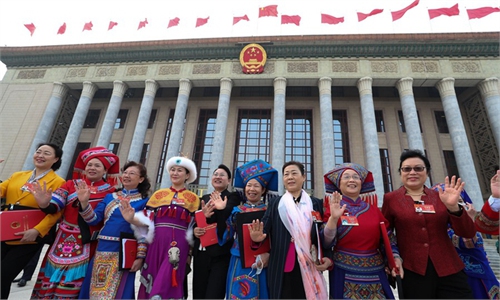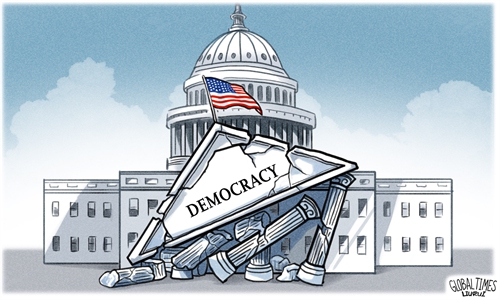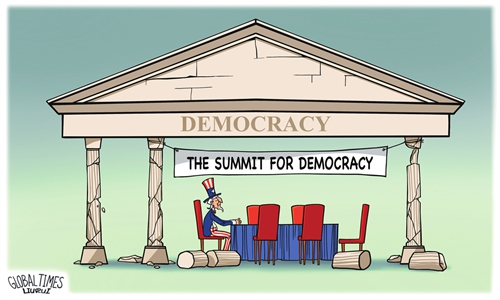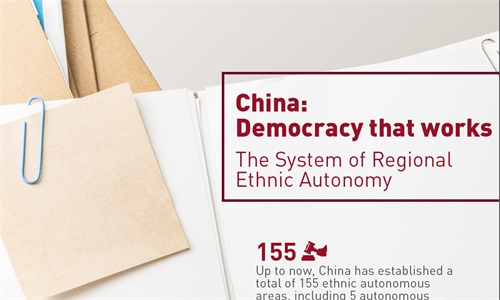China’s white paper upends US and West’s monopolistic definition of democracy: Global Times editorial
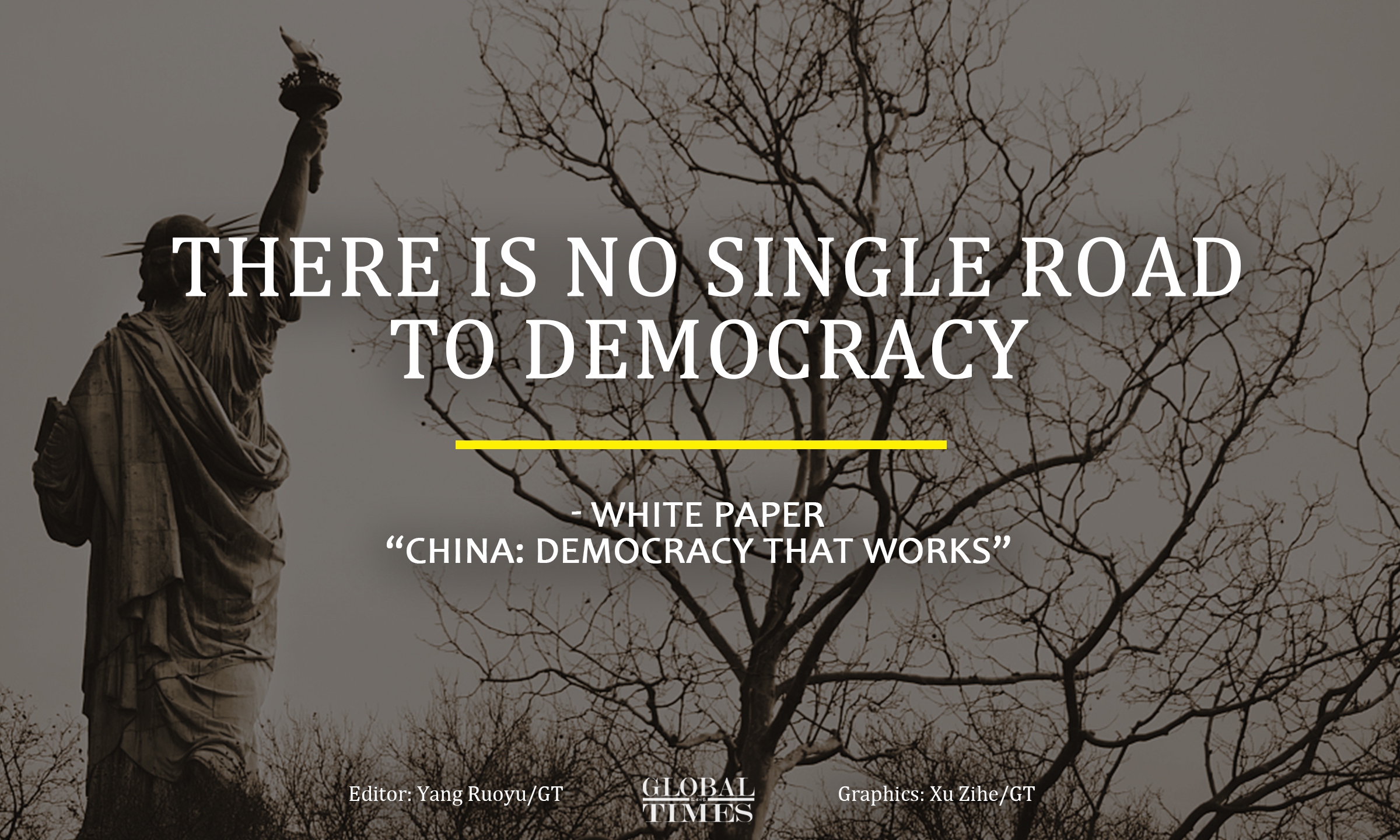
US' hegemonic mindset in the name of democracy Graphics: Xu Zihe/GT
China's State Council Information Office on Saturday released a white paper titled "China: Democracy That Works." The main body of the white paper is divided into five sections: "Whole-Process People's Democracy Under CPC Leadership," "A Sound Institutional Framework," "Concrete and Pragmatic Practices," "Democracy That Works" and "A New Model of Democracy." The document represents a systematic discourse on democracy published by a major country outside the Western system which has received huge practical support. China is also the first large-scale society in the world to practice whole process people's democracy.
The publication of the document has challenged the US and West's monopolistic definition of democracy, marking the further clarification of human beings' various practices of democracy. China's economic and social construction continues to make world-renowned achievements, people's comprehensive rights are also continuously improving. China has also achieved results that have embarrassed the West in the fight against the sudden COVID-19 outbreak, protecting people's lives in a most effective way. The whole process people's democracy proposed by China has a strong realistic foundation and basis. It will not be a short-lived slogan, but will continue to unfold with the great rejuvenation of the Chinese nation and form a demonstration of democratic construction outside of the West.
American democracy, as a representative of Western democracy, has shown serious inefficiency after more than 200 years of over-consumption. It cannot provide motivation for resolving even the most prominent problems in the US. It has almost become a hollow framework, habitually holding rounds of elections. Elections themselves have become the sole feature of its democracy, and winning the election has become the overwhelming goal of political parties and politicians. With US society is being torn apart, it is increasingly politically uneconomical to work on solving problems. It is proven to be a "smarter" way to pretend to solve the problem and then blame political opponents for being unable to resolve issues, and to defraud the trust of voters.
The American people will be valued by politicians as the object of persuasion, only when they are "voters." But after each election, they cannot continuously supervise the winning side. Generally, the US and West are relatively "small governments," and governments do not bear unlimited moral responsibility for people's livelihood. Even if the COVID-19 pandemic led to more than 700,000 deaths in the US, the federal government does not need to take the responsibility. Instead, the president can shirk responsibility onto ordinary people who do not get vaccinated or refuse to wear masks.
In the US, there is a very strong intermediary force between the government and the people: capital. Capital can not only strongly influence government's decision-making, but is also the dominant force in guiding social relations. It is the real immutable force in the US' democratic power distribution.
Within the national structure shaped by the leadership of the Communist Party of China, the government directly faces the people. Viewing people as its center to promote national progress and letting people share the fruits of these advancements is the fundamental meaning and logic of whole process people's democracy.
In the beginning, US-style democracy was democracy for slave owners and a minority of societal elites, then, it gradually expanded to "one person, one vote." However, as the social interest pattern has been divided up and polarized, ordinary people are unable to convert their votes into a means to protect their actual interests. The government for them is an abstract concept in real life. Congressmen and senators are obsessed with quarreling and garnering attention. The federal government can totally ignore media criticism and even scold media. As a result, no matter what media says, it has no effect.
Whole process people's democracy puts the government in a position that it should work to maximize people's welfare. Our democracy is designed to address real world problems, ranging from poverty, air pollution, to curbing the spread of the pandemic, and alleviating power shortages. The Chinese people are concerned and impacted by these problems. They have become key areas and focuses of national governance and China has achieved tangible results across these areas.
Some people argue that Chinese people have no platform to express their opinions. This is a benchmark against the West public opinion's disorderly expression. As a matter of fact, there are many institutional channels for exchanging opinions from top to bottom in the Chinese society, for example, the institutional channel for tipping off corruption. Chinese people can not only voice problems related to their everyday lives, but can also receive attention from authorities and are highly likely to get their problems solved. Some of the problems are complex and involve a wide range of issues. In this case, the country will address these issues in stages.
We don't think the Western-style democratic system is without merit . For example, the rule of law holds high authority in many Western countries and the societies have been firmly accustomed to solving specific disputes through judicial channels. There are areas worth studying. China's whole process people's democracy does not hold an antagonistic relationship with the Western-style democracy. They are products of different historical and cultural backgrounds in different countries. They should practice in their own way and learn from each other.
However, some forces in the US and the West continue to attack China's basic political system based on their narrow-minded interest outlook and values. They are trying to define who is democratic and who is not. This is a premise that the Chinese government and people will never agree to.
Today's Chinese society is full of political confidence, because we have seen our success, progresses, and effectiveness in dealing with a public health crisis as severe as COVID-19. We advocate democracy, and are committed to practicing democracy. For those forces who are slandering us, we want to say: Compare your achievements with ours, you will find yourselves stuck in stagnation, and then you will know your democracy is no longer worth bragging about.
